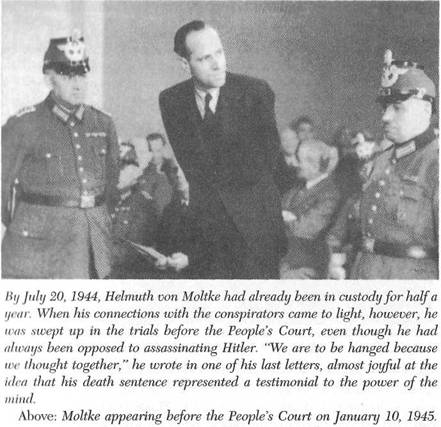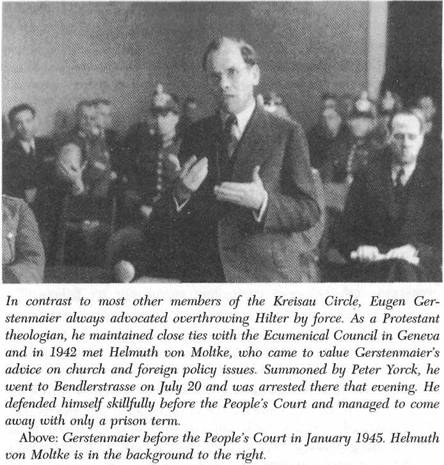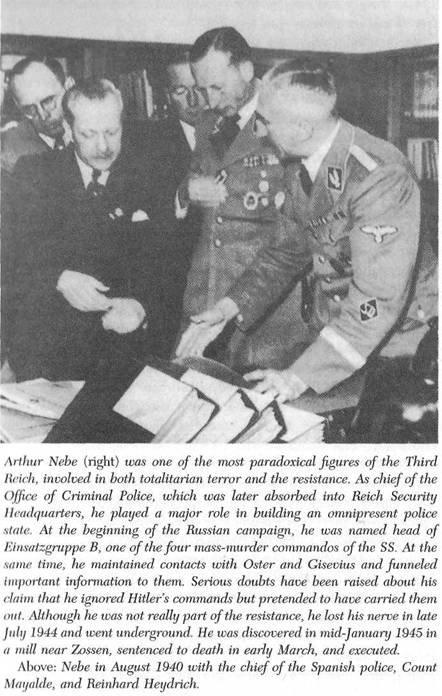his refusal to help on the day of the coup attempt). On October 20, Julius Leber and Adolf Reichwein were condemned, then Captain Hermann Kaiser, General Lindemann, Theodor Haubach, and many others.
Moltke was tried on January 9-10, 1945, along with Alfred Delp, Eugen Gerstenmaier, and a few other friends from the Kreisau Circle. Moltke’s connection with the events of July 20 was actually more circumstantial than direct, though he had associated with a number of the rebels. Immediately after the attempted assassination and coup he remarked, “If I had been free, this would not have happened,” a reference to the fact that he had already been arrested by that time. At his trial he continued to insist that he was opposed to any acts of violence.

Despite his negligible role in the coup, Moltke exemplifies better perhaps than any other opposition figure the deep ambivalence of the German resistance. The records of his trial have been lost, like so many others, but on January 10 and 11, shortly after his trial, he wrote two letters to his wife that were spirited out of his cell by Poelchau, the chaplain. They contain far more than just personal comments. An entire intellectual climate emerges in the love of philosophizing, the distaste for practical action, and the religiously inspired joy at the prospect of death. As one of the early chroniclers of the German resistance commented, Moltke’s letters can only be read “with horror and admiration.”31
The letters begin with an extensive description of his trial, at which Kreisler sought to portray not Goerdeler but the Kreisauers—“these young men”—as the actual “engine” behind the coup. Moltke emphasizes repeatedly that he not only agreed with that assessment but was absolutely delighted by Freisler’s decision to drop all specific allegations related to practical preparations for the coup in order to focus on the real crimes: “defeatist” thought and adherence to the Christian and ethical principles to which Moltke and his friends wanted society to return.

“Ultimately,” says Moltke in the first of these long letters, “this concentration on the religious aspect corresponds with the inner nature of things and shows that Freisler is a good political judge after all. It gives us the inestimable advantage of being killed for something that (a) we really have done and (b) is worthwhile.” He continues, “It is established that we never wanted to use force; it is established that we did not make a single attempt to organize anything, did not promise a single person a future post-though the indictment said otherwise All we did was think-and really only Delp, Gerstenmaier, and I…And it is before the thoughts of these three isolated men, the mere thoughts, that National Socialism now so trembles that it wants to exterminate everything that is infected by them. If that isn’t a compliment of the highest order! After this trial we are free of all the Goerdeler mess; we are free of all practical questions. We are to be hanged because we thought together. Freisler is right, right a thousand times over. If we are to die, then let it be for this… . Long live Freisler!”
These few lines distill both what was memorable about the German resistance but what, at the same time, constituted its greatest weakness and the most compelling reason for its failure. The “Goerdeler mess” about which Moltke writes so disparagingly was in fact nothing other than a practical relation to the world, to people, and to the forces at work-in a word, to reality. Virtually all the opposition groups, though some more than others, liked to think of themselves as above the concerns of the grimy everyday world, and that attitude seriously compromised their ability to accomplish anything, especially as the Nazis did not respect the distinction but viewed thought and action as one. On the final judgment against Moltke one contemporary who had read the letters commented curtly, “He did more than just think.”
In his second letter, dated January 11, 1945, Moltke returned to his earlier line of reasoning: “Of that entire gang only Freisler recognized me, and of that entire gang only he understands why he must kill me… . The key to the trial lay in the words ‘Christianity and National Socialism have one thing in common, Count von Moltke, and only one: we both demand the whole person.’ Did he realize what he was saying? Just think how wonderfully God prepared this, his most unworthy vessel. At the very moment when I was in danger of being drawn into active preparations for the putsch-when Stauffenberg came to see Peter [Yorck] on the evening of the 19th [of January 1944]-I was taken away, so that I could, and will continue, to remain free of any connection with violence.”
Such shifts in tone from factual narration to pious contemplation are already present in the opening, primarily descriptive passages of the letters, but they become more frequent in the more personal parts that follow, until finally spiritual meditations, biblical references, and verses from songs build to a kind of exuberant longing for death that leaves no room for sorrow and farewell, only a sense of divine mission, fulfillment, and the grace of God. Moltke notes on a number of occasions that he feels “exalted and uplifted,” even though those around him seem “quite shocked.” Toward the end he writes, “I have wept a little, not out of sadness or melancholy, not because I would like to undo what I have done, but because I am thankful and moved by this sign from God. It is not given to us to see him face to face, but we must feel deeply moved when we suddenly realize that he has gone before us our entire lives, a cloud by day and a pillar of fire by night, and that all at once he is allowing us to glimpse this truth. Now nothing more can happen.”
On January 12, 1945, Moltke’s death sentence was handed down. He was executed eleven days later, on January 23, together with nine other prisoners. Shortly thereafter, on February 3, just as Freisler was launching the proceedings against Fabian von Schlabrendorff, air raid sirens began to howl. In the heaviest aerial attack on Berlin of the entire war, one bomb hit the building on Bellevuestrasse where the People’s Court was in session. A falling beam struck Freisler on the head as he clutched the files on Schlabrendorff. Otherwise no one was injured. A passing doctor was summoned from the street, but he could only confirm that Freisler’s wounds were fatal. (Ironically, the doctor turned out to be the brother of Rudiger Schleicher, whom Freisler had condemned to death the previous day.) Schlabrendorff’s trial had to be postponed, and when he was brought before the court again in mid-March he was acquitted on a technicality: he had been tortured, in violation of the law.32
Some other of the conspirators managed to cheat death as well, including almost all of Tresckow’s friends in Army Group Center, among them Philipp von Boeselager, Rudolph-Christoph von Gersdorff, and Eberhard von Breitenbuch. Several members of the Kreisau Circle-Horst von Einsiedel, Carl Dietrich von Trotha, Otto von der Gablentz, the Jesuit priest Augustin Rosch, and others-also survived. Eugen Gerstenmaier dodged a death sentence by playing the role of the naive theologian baffled and bewildered by the world of politics; so convincing was he that Freisler condemned him to only seven years in prison. Hans Bernd Gisevius managed to escape to Switzerland, thanks to his foreign connections and especially the intervention of Allen W. Dulles, the head of the Office of Strategic Services. Erich Kordt was a safe distance away at a diplomatic posting in China, and Theo Kordt was in Switzerland. Friedrich Wilhelm Heinz was well-acquainted with life underground and numbered among the very few, including Jakob Kaiser and the Hammerstein brothers, Kunrat and Ludwig, who managed to survive the war in hiding. Hans von Boineburg was assigned to an army punishment detail, as was Harald Momm, the colonel who had called for a bottle of champagne in Krampitz on hearing news of the attack on Hitler.33 Less fortunate was Arthur Nebe, who finally went underground on July 24. Making use of all the evasive ruses at his command, he feigned suicide, leaving fake farewell letters behind. He managed to escape detection until January 16 but was finally arrested, brought before the courts, and executed in March 1945. That same month, so close to the end of the war, Friedrich Fromm was convicted on a charge of cowardice and, in what was viewed as an act of leniency, sentenced to be shot by a firing squad. The execution was carried out on March 12, 1945, in Brandenburg prison.

One month later, as the Red Army girded itself for the final assault on Berlin, Hitler’s campaign for revenge was still going strong. The jails were filled to overflowing with political opponents who either had been condemned or were awaiting trial. On April 14 Himmler ordered that none of these prisoners were to survive the war. Earlier, Gestapo chief Heinrich Muller had told Moltke’s wife, Freya, “We won’t make the same mistake as in 1918. We won’t leave our internal German enemies alive.”34
By this point, however, events were beginning to overtake Himmler, Muller, and the Gestapo in general. On April 21-the same day that an agitated Hitler called General Karl Koller, the chief of staff of the Luftwaffe, to Inform him that the heart of Berlin was under artillery bombardment-eleven men who had not yet been sentenced were released. One of them sought, on the spur of the moment, to obtain the release of other prisoners as well. On April 23 his efforts resulted in the freeing of prisoners incarcerated at Moabit prison. The SS, however, had taken charge of liquidating the Gestapo prison on Lehrterstrasse. Here, too, twenty-one inmates facing lesser charges had already been released, among them the lawyer Hans Lukaschek and Kraft von Palombini, who had sheltered Goerdeler. Some of the remaining inmates were informed that they would be released after transfer to headquarters on Prinz-Albrecht-Strasse. They were herded together by SS guards and marched off down

